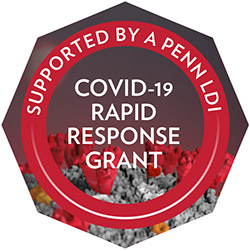News
A Year Later: Penn LDI COVID-19 Rapid Response Research Grant Projects
Fast Entry in Early Pandemic Months Benefitted Public Health and Researchers
A year after the Leonard Davis Institute of Health Economics (LDI) created a program of Rapid Response Grants for COVID-19 research, the projects have produced important new insights relevant to current pandemic response, as well as preparations for future infectious disease emergencies.
The initiative began within days of the federal government’s March 13, 2020 COVID-19 national emergency declaration as LDI began brainstorming ways the Institute could harness the expertise of its Fellows and staff to assist in the emergency response. It sent out requests for proposals to its more than 300 health services researchers. LDI Executive Director Rachel M. Werner, MD, PhD, wrote that proposals “should address population health, health care, and system delivery issues needed to understand and address the current COVID-19 pandemic or improve responses to future infectious disease outbreaks, particularly related to disparities and underserved populations.”
13 Projects, 25 LDI Fellows
Designed to be conducted and concluded within six months or less, the grants that were announced in the first week of May, 2020 covered 13 team projects involving 25 LDI Senior and Associate Fellows.
The resulting work ran a wide gamut—from a study of deficiencies in health systems’ COVID visitation restriction policies, to an analysis of how Pennsylvania officials were underestimating infection rates. Other projects included a six-state comparison of how conflicting and inaccurate information were impeding the acquisition of critical epidemiological data, and an analysis of how the pandemic changed both the patterns and reporting of child abuse.
Another multi-state study of 254 hospitals found that most institutions lacked benchmark patient-to-nurse ratios before the pandemic, and that those working conditions left the institutions ill-prepared to meet the greatly increased demands of the pandemic. A second Rapid Response nursing study drew insights from the experience of the 1918 flu pandemic, underscoring the importance of having an adequate supply of well-educated nurses during such a national medical emergency as well as the need for a central national nurse registration system rather than the current state-based nurse licensing system.
High-Impact Studies

“Small pilot grants such as these Rapid Response Grants allow researchers to devote effort to timely and potentially high-impact studies that might otherwise not be feasible to pursue,” said LDI Senior Fellow and Perelman School of Medicine Assistant Professor Nadim Mahmud, MD, MS, MPH. His research project analyzed how COVID-19 disruptions were affecting the access and quality of care among Veterans Health Administration cirrhosis patients.
“I’m now involved in a number of additional studies topically related to COVID-19,” said Mahmud. “Some of them were conceived in the course of brainstorming ideas and working with data related to the LDI Rapid Response Grant, so there’s a longer-term effect beyond the grant itself.”
Other primary investigators also explained that their LDI Rapid Response grants findings are informing efforts to improve COVID-related policies at the same time the work has led to development of other, related research projects.
Government of Greece

LDI Senior Fellow and Wharton School Assistant Professor of Operations, Information and Decisions, Hamsa Bastani, PhD, said her grant “provided me with very timely resources that made it possible to build a number of scrapers to collect daily data, which would have expired by the time we would have been able to access it in the standard funding cycle.”
Bastani’s Rapid Response project used novel methods to develop unbiased estimates of the true number of COVID-19 cases in Pennsylvania that were 1.5 times higher than state officials’ public estimates. The innovative estimating strategy drew the attention of Greece’s Government, which commissioned Bastani’s Wharton/University of Southern California team of researchers to help develop a COVID-19 vetting process at that country’s ports of entry.
“Our project with Greece was partly initiated by the LDI Rapid Response targeting testing work,” Bastani said. “The actual Greek work ended up being different, but the LDI project opened that door for me.”
LDI Senior Fellow Karen Glanz, PhD, MPH, had a similar experience.
Epidemiological Data Void

“In the case of COVID, early pilots like these Rapid Response Grants helped researchers ‘get on the map’ as having some evidence-informed knowledge about the pandemic,” said Glanz, Director of the Penn Prevention Research Center and a professor at both the Perelman School of Medicine and the Penn School of Nursing. The Glanz Rapid Response project focused on risk perceptions and the lack of accurate epidemiological information among health officials and policymakers in six states.
“In our case,” said Glanz, “the LDI grant directly contributed to new collaborations on both a Community Engagement Alliance (CEAL) Against COVID-19 Disparities grant from the National Institutes of Health, and another grant from the Pennsylvania Department of Health.”
Political scientist and LDI Senior Fellow Daniel Hopkins, PhD, of Penn’s School of Arts & Sciences characterized the LDI grant as a “rare opportunity.”
Real-Time Experiments

“Short time-frame funding is difficult in the social sciences but as the pandemic shut down so much of the U.S., LDI’s Rapid Response Grant provided me with the opportunity to do a survey and embedded experiments in real time,” said Hopkins.
“One of the central dynamics of the pandemic response has been political polarization—and my LDI-funded work was among the first published articles to clearly show how politicized responses to the pandemic and vaccination would become,” Hopkins said. His Pennsylvania-wide survey on several COVID-related policies found strong support for social distancing and high levels of public trust in medical experts—factually contradicting media and social media reports of widespread of public mistrust of public health experts.
“The data,” Hopkins continued, “led to two follow-up surveys as well as one published paper and another paper that’s been submitted to an academic journal. The LDI Rapid Response Grant provided the proof of concept from which we were able to do additional fundraising.”
Decline in Safety Net Use

A pediatrician focused on the intersection of childhood development and health disparities, LDI Senior Fellow James Guevara‘s Rapid Research project studied the impact of safety net programs’ rapid shift to digital access and communications early in the pandemic. The focus was on understanding why, in a time of greatly increased need, low-income, racial-minority families’ actual use of safety net programs declined, including the Special Supplemental Nutrition Program for Women, Infants, and Children (WIC), the Supplemental Nutrition Assistance Program (SNAP), and Medicaid CHIP.
Among the barriers responsible for the decrease in access, Guevara identified safety net programs’ poor communication of program changes, lack of available customer assistance, poor engagement with digital services, and the lack of adequate internet connectivity throughout the communities that were safety net programs’ primary service areas.
Guevara, MD, MPH, a Professor at both Children’s Hospital of Philadelphia and the Perelman School of Medicine, is continuing to work beyond the Rapid Response project to advocate for major upgrades in the extent and quality of safety net programs’ digital accessibility and response.
“We are currently pursuing state policy changes in WIC. This LDI-funded work provided the project data to inform that advocacy,” said Guevara. “We’re also considering pursuing virtual patient navigation for a safety net enrollment app, and this project also provided a rationale and preliminary data for that.”
Shutting Out Patients’ Families

Noting another beneficial career dimension of the Rapid Response research was LDI Senior Fellow Joanna Lee Hart, MD, MSHP, an Assistant Professor of Medicine at the Perelman School of Medicine. A core faculty member of Penn’s Palliative and Advanced Illness Research Center, her research focuses on medical decisions under conditions of uncertainty in serious illness care. In her Rapid Response project, she studied the content and impact of policies that tightly restricted family access to patients during the pandemic.
“This funding opportunity during the pandemic was a critical tool to connect my administrative and clinical work—which greatly expanded during the pandemic—to my research,” said Hart. “I was actively working to support family members and patients during the early phases of COVID-19, including drafting materials and tools for staff, families, and patients to support family-centered care; founding and running a program that connected furloughed medical students with hundreds of family members of admitted patients at the peak of the visitation restrictions; and serving on the visitation committee for the Hospital of the University of Pennsylvania (HUP).”
“While this effort was viewed as critical to the clinical response to COVID,” Hart continued, “these efforts are not directly related to my tenure-track career metrics. Therefore, this Rapid Response pilot program allowed me to use the expertise I had gained to generate evidence that could directly answer questions that arose in that administrative and clinical work.”
Two of the 13 projects were headed by principal investigators who were young Associate LDI Fellows.
Child Abuse During Pandemic

“These Rapid Response Grants were a jumpstart for early career trainees like me,” said one of them, Robin Ortiz, MD, a Penn National Clinician Scholar. Her project partnered with Childhelp, the national child abuse hotline, to analyze how the pandemic was affecting both the level of child abuse and the various avenues for reporting and responding to it. The findings were published in a research letter in JAMA Pediatrics and also became the subject of a major CNN article.
“I was able to begin a collaboration with a national organization that began as a single project,” said Ortiz. “It is now blossoming into creating systems change in advancing the mission of the organization, as well as my own research trajectory to better support children and families in distress. This collaboration is now what I envision as a career-long partnership.”
